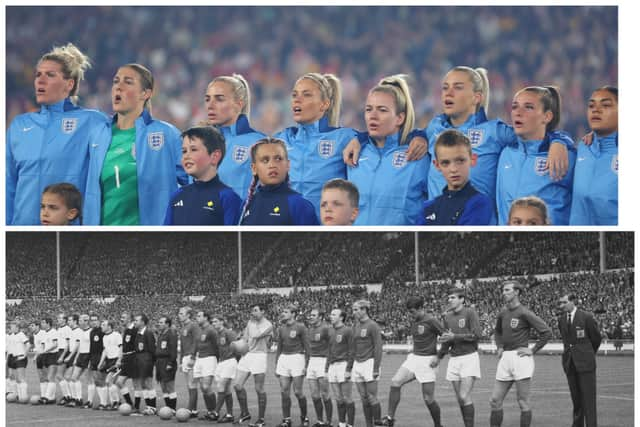How England’s Lionesses team lineup compares to men’s 1966 winning squad
and live on Freeview channel 276
England Women’s football team are taking on Spain in the World Cup final in the hope of ‘bringing it home’ for the nation.
The last time England won the World Cup was back in 1966 when Sir Alf Ramsey’s team beat West Germany 4-2 in the final.
Advertisement
Hide AdAdvertisement
Hide AdAll eyes are now on the women so the country can lift up the trophy once again after 57 years.
Here we compare the men’s 1966 winning team to the lineup of the Lionesses today (Sunday 20 August).
Defence
Back in 1966, the men’s goalkeeper was Gordon Banks. Banks entered the tournament as England’s undisputed number one goalkeeper and played every minute of the World Cup campaign.
The women’s goalkeeper is Millie Bright, also the captain of the team, who is one of the most experienced members of the squad.
Advertisement
Hide AdAdvertisement
Hide AdThe men’s team in 1966 had four defenders including Ray Wilson on the left, George Cohen on the right and Bobby Moore and Jack Charlton as central defenders.
Ray Wilson was from Derbyshire and the oldest member of the team that went out to face West Germany in the final. George Cohen made 459 appearances for England, while Bobby Moore was known as the "golden boy of English football" and Jack Charlton was England’s strong centre-half.
The women’s team has two defenders which includes Alex Greenwood on the left and Jess Carter on the right.
Greenwood currently plays for Manchester City and Carter plays for Chelsea.


Midfield
Advertisement
Hide AdAdvertisement
Hide AdIn 1966, the men’s football team had four players in midfield with Martin Peters left midfield, Alan Ball right midfield and Bobby Charlton and Nobby Stiles in the middle.
Peters, from London, was a key figure in England’s 1966 World Cup side and Alan Ball was the youngest player of the team.
Charlton played over 600 times for England while Stiles played for England for five years.
For the women’s team, they have five players in midfield with Rachel Daly in left midfield and Lucy Bronze in right midfield.
Advertisement
Hide AdAdvertisement
Hide AdDaley, from Harrogate, plays for Aston Villa and Bronze, from Berwick-upon-Tweed, plays for Liga F club Barcelona.
Toone has represented England at under-17, under-19, under-21, and senior levels. Walsh has previously played for Blackburn Rovers and Manchester City, and Great Britain at the Olympics, and Stanway plays as an attacking midfielder for Frauen-Bundesliga club Bayern Munich.
Stanway is widely considered one of the best attacking midfield players of her generation.
Forward
The strikers in the men’s team playing upfront were Roger Hunt and Geoff Hurst.
Advertisement
Hide AdAdvertisement
Hide AdRoger Hunt MBE was an English professional footballer who played as a forward. Eleven years with Liverpool, he was the club’s record goal-scorer, hitting the back of the net 286 times, until being overtaken by Ian Rush.
Sir Geoffrey Charles Hurst became the first, and one of the only two men, to ever score a hat-trick in a World Cup final, when England recorded their 4–2 victory over West Germany at Wembley Stadium in 1966.
For the women’s team both Lauren Hemp and Alessia Russo are upfront. Hemp plays as a forward for Women’s Super League club Manchester City and was named England Young Player of the Year in September 2016 and 2017.
Russo plays for Arsenal and her outrageous back-heel in England’s semi-final defeat of Sweden has been voted the best goal of UEFA Women’s EURO 2022 in a fan poll.
Comment Guidelines
National World encourages reader discussion on our stories. User feedback, insights and back-and-forth exchanges add a rich layer of context to reporting. Please review our Community Guidelines before commenting.
